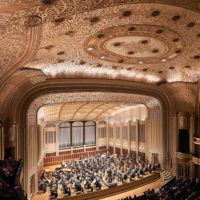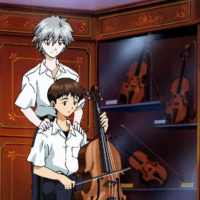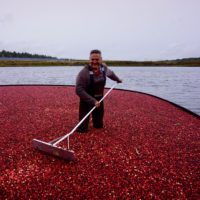I am writing a book about The Moral Foundations of Public Funding for the Arts. My first diary entries are here and here. How did I come to be writing on this topic? Let's go way back... In high school I was one of the band room kids: French horn in band, bass in jazz band, chamber choir, musical theatre, rock and roll on the side, and the minimal amount of academic subjects I could get away with. My music teacher, Mr Burritt, remains the most influential teacher in my life. And with that, I applied to the university music school, in the … [Read more...]
Book Diary – April 27 – Arts Funding and Welfarism, Merit Goods, Who Cares if you Listen?, and a first look at Perfectionism…
'I think there can't be too many pictures and statues and works of art,' Hyacinth broke out. 'The more the better, whether people are hungry or not.' Henry James, The Princess Casamassima This week (and the next few weeks) I have been wrestling with the topic of perfectionism in moral theory. It has very important implications for how one might justify public funding for the arts, and might deal a heavy blow against such funding. Let's start with how economists look at the world (yes, typical of an economist to do this). When … [Read more...]
Book Diary – April 22
I am writing a book, on the "moral foundations of public funding for the arts". It will eventually appear in the series New Directions in Cultural Policy Research, hopefully some time in 2023. But first I have to write it. This diary will chart my progress through the year, and I will always welcome your comments and suggestions. So what is it about? Take as an example a major American orchestra. Each year, it might get $40,000 or so from the National Endowment for the Arts, around $500,000 from its state arts council, and perhaps … [Read more...]
About that French Culture Pass…
The French government had the idea to give teenagers a 300 Euro credit (through a phone app) to spend on "culture". A few limits were placed upon it - a 100 Euro maximum on online subscriptions, and any video games had to be French (trade protectionism is a given in any French cultural policy) - but otherwise the youths had a pretty free hand. And with those free hands they spend roughly half their totals on Manga. The New York Times reports: As of this month, books represented over 75 percent of all purchases made through the app since it … [Read more...]
Do we know how changing prices affects the income-diversity of audiences?
In the very first few weeks of Econ 101 students are introduced to the "demand curve", relating how changes to the price of a product affect the quantity demanded of the product, all other things held equal. I've spent many years drawing these on blackboards, but they are a lot more easily drawn than estimated, and firms faced with the real-world problem of setting prices have to meld a bit of know-how, awareness of their market environment, and the occasional experiment with (slightly) changing a price to find an optimum. I even wrote a short … [Read more...]
The WPA is history
New York City has announced a new (well, sort of) arts program. Hyperallergic reports: The City of New York will put some artists to work this summer with a $25 million program inspired by the New Deal’s Works Progress Administration (WPA). Announced yesterday, May 6, the recovery program will pay hundreds of local artists to beautify and activate public spaces across the city with murals, public artworks, performances, and more.The new program, called City Artist Corps, is expected to create jobs for more than 1,500 artists in NYC, a … [Read more...]
What are Learning Outcomes For?
‘Bitzer,’ said Thomas Gradgrind. ‘Your definition of a horse.’ ‘Quadruped. Graminivorous. Forty teeth, namely twenty-four grinders, four eye-teeth, and twelve incisive. Sheds coat in the spring; in marshy countries, sheds hoofs too. Hoofs hard, but requiring to be shod with iron. Age known by marks in mouth.’ Thus (and much more) Bitzer. ‘Now girl number twenty,’ said Mr Gradgrind. ‘You know what a horse is.’ The opening chapters of Dickens’ Hard Times probably have all of us recoil at the insistence of Mr Gradgrind on a school where … [Read more...]
Economic Impact: A Quick and Dirty Critique
Teaching arts policy this fall, I needed a two-page briefing to warn my students off using economic impact studies as an arts advocacy tool. Here's the result: What is an Economic Impact Study? Definitions are hard to come by. I can tell you how a number is calculated, so let’s start there. Pick a sector: it can be film production in a state, or nonprofit arts organizations, or cranberry farming, or anything. First ask: What were total sales in that sector in a state over the course of a year? That should be easy to figure – every … [Read more...]
It’s Friday, Ask Me Anything
The amazing students in our Arts Administration program at the O'Neill School at Indiana University have requested an ask-me-anything day, and so here it is. Through the day you can continue to ask questions either in the comments section here, or on Twitter, and I'll do my best. 2:30 pm What is the most valuable lesson you've learned as a parent? I'll give a list: Be as good as you can, know you will never be perfect; let children explore; recognize when you have done wrong, apologize for it, but don't dwell on it, look forward and be … [Read more...]
Strategic Planning and Muddling Through
Out in the woods for today's video, on Charles Lindblom's classic essay "The science of 'muddling through'". When an arts organization sets out to form a strategic plan, what exactly is it doing? Is a so-called 'logic model', that carefully sets out desired outcomes, and then works backwards through the most effective outputs and actions, the way we actually conceive of the problem? Or in fact is what we do in practice much more modest, taking existing activities as more-or-less given, and looking to a few changes at the margin that ought to be … [Read more...]










